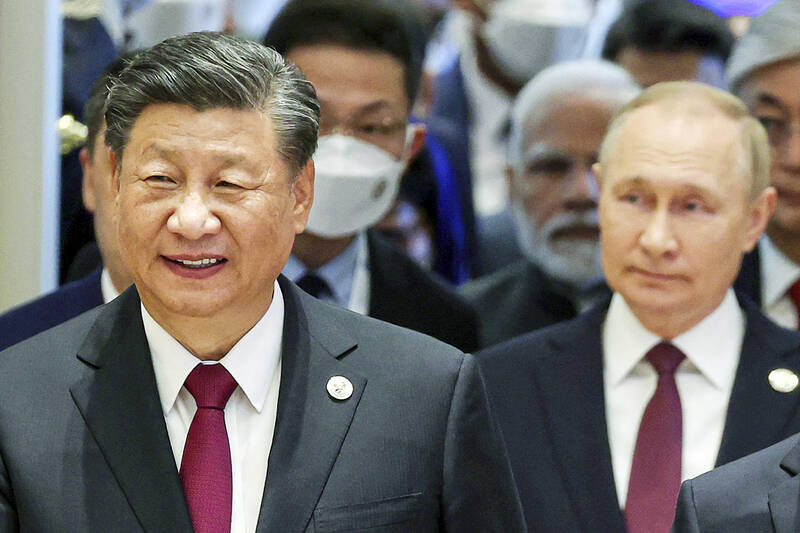Ties between Russia and China are a threat to global peace, and the international community must resist the “expansion of authoritarianism,” officials in Taipei said yesterday.
Russian President Vladimir Putin on Thursday met Chinese President Xi Jinping (習近平) for their first face-to-face talks since the start of the conflict in Ukraine, hailing their strategic ties in defiance of the West.
In the Uzbek city of Samarkand, Xi told Putin he was “willing to make efforts with Russia to assume the role of great powers.”

Photo: AP
Putin reiterated Russia’s support for China’s claim over Taiwan. The relationship between the two leaders has rattled Taipei, where the Ministry of Foreign Affairs said it “severely condemns Russia for following the Chinese Communist Party’s [CCP] authoritarian expansionist government to continue to make false statements at international venues that demean our country’s sovereignty.”
“[Russia] calls those who maintain peace and the status quo provocative, which highly demonstrates the harm caused by the alliance of Chinese and Russian authoritarian regimes on international peace, stability, democracy and freedom,” the statement said.
Formerly Cold War allies with a tempestuous relationship, China and Russia have drawn closer in recent years as part of what they call a “no-limits” relationship acting as a counterweight to US global dominance.
For Putin, the Shanghai Cooperation Organisation summit in Samarkand comes at an important time, as his forces face major battlefield setbacks in Ukraine and a continued Western push to make Russia an international pariah.
For Xi, it is an opportunity to shore up his credentials as a global statesman ahead of a pivotal CPP congress next month, in which he is expected to secure a third term.
“China is willing to make efforts with Russia to assume the role of great powers, and play a guiding role to inject stability and positive energy into a world rocked by social turmoil,” Xi told Putin at the talks.
China Central Television also quoted Xi as saying that China was willing to work with Russia to support “each other’s core interests.”
Putin took a clear broadside at the US, which has been leading efforts to support Ukraine and impose sanctions on Russia.
“Attempts to create a unipolar world have recently acquired an absolutely ugly form and are completely unacceptable,” Putin said.
“We highly appreciate the balanced position of our Chinese friends in connection with the Ukrainian crisis,” Putin told Xi, while reiterating Moscow’s backing for China on Taiwan.
“We condemn the provocation of the US and their satellites in the Taiwan Strait,” Putin said, after a US Senate committee on Wednesday took the first step toward Washington directly providing billions of dollars in military aid to Taiwan.
It was the first in-person meeting between the two leaders since Putin saw Xi in early February for the Winter Olympic Games in Beijing, days before the Russian leader launched an invasion of Ukraine.
The Kremlin has touted the summit in the ancient Silk Road city of Samarkand as showing there is an “alternative” to Western-dominated international institutions.
The Shanghai Cooperation Organisation — comprising China, India, Pakistan, Russia and the ex-Soviet Central Asian nations of Kazakhstan, Kyrgyzstan, Tajikistan and Uzbekistan — was established in 2001 as an economic and security group to rival Western institutions.

DAREDEVIL: Honnold said it had always been a dream of his to climb Taipei 101, while a Netflix producer said the skyscraper was ‘a real icon of this country’ US climber Alex Honnold yesterday took on Taiwan’s tallest building, becoming the first person to scale Taipei 101 without a rope, harness or safety net. Hundreds of spectators gathered at the base of the 101-story skyscraper to watch Honnold, 40, embark on his daredevil feat, which was also broadcast live on Netflix. Dressed in a red T-shirt and yellow custom-made climbing shoes, Honnold swiftly moved up the southeast face of the glass and steel building. At one point, he stepped onto a platform midway up to wave down at fans and onlookers who were taking photos. People watching from inside

A Vietnamese migrant worker yesterday won NT$12 million (US$379,627) on a Lunar New Year scratch card in Kaohsiung as part of Taiwan Lottery Co’s (台灣彩券) “NT$12 Million Grand Fortune” (1200萬大吉利) game. The man was the first top-prize winner of the new game launched on Jan. 6 to mark the Lunar New Year. Three Vietnamese migrant workers visited a Taiwan Lottery shop on Xinyue Street in Kaohsiung’s Gangshan District (崗山), a store representative said. The player bought multiple tickets and, after winning nothing, held the final lottery ticket in one hand and rubbed the store’s statue of the Maitreya Buddha’s belly with the other,

Japan’s strategic alliance with the US would collapse if Tokyo were to turn away from a conflict in Taiwan, Japanese Prime Minister Sanae Takaichi said yesterday, but distanced herself from previous comments that suggested a possible military response in such an event. Takaichi expressed her latest views on a nationally broadcast TV program late on Monday, where an opposition party leader criticized her for igniting tensions with China with the earlier remarks. Ties between Japan and China have sunk to the worst level in years after Takaichi said in November that a hypothetical Chinese attack on Taiwan could bring about a Japanese

‘COMMITTED TO DETERRENCE’: Washington would stand by its allies, but it can only help as much as countries help themselves, Raymond Greene said The US is committed to deterrence in the first island chain, but it should not bear the burden alone, as “freedom is not free,” American Institute in Taiwan Director Raymond Greene said in a speech at the Institute for National Defense and Security Research’s “Strengthening Resilience: Defense as the Engine of Development” seminar in Taipei yesterday. In the speech, titled “Investing Together and a Secure and Prosperous Future,” Greene highlighted the contributions of US President Donald Trump’s administration to Taiwan’s defense efforts, including the establishment of supply chains for drones and autonomous systems, offers of security assistance and the expansion of